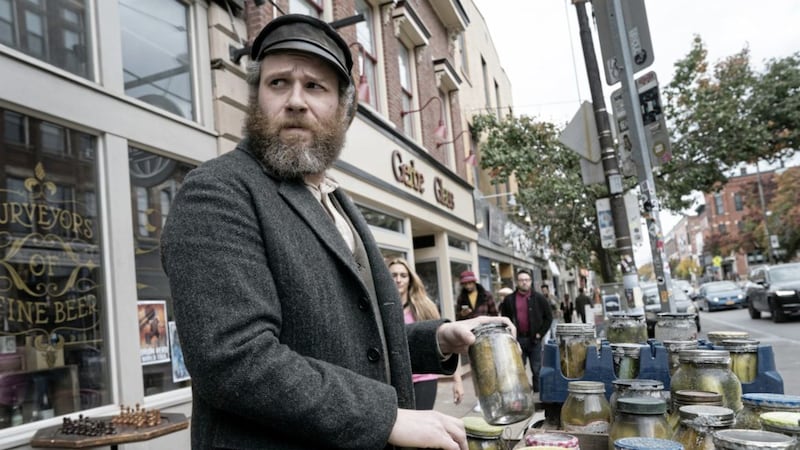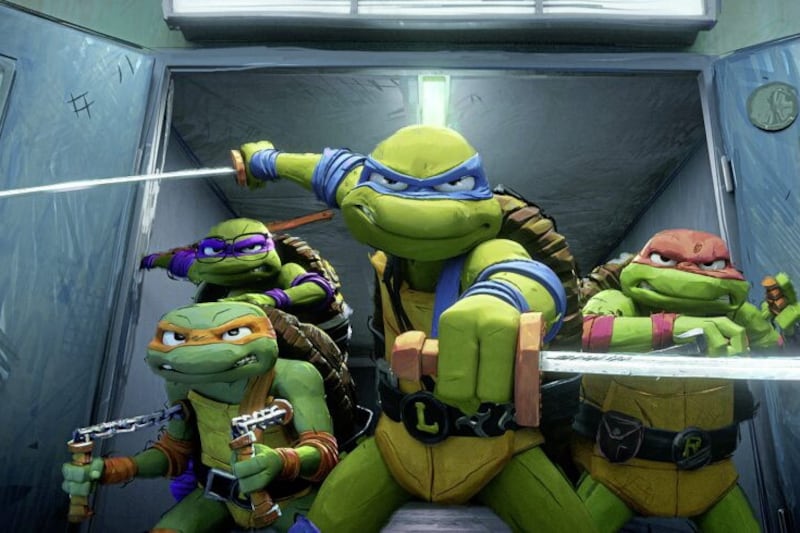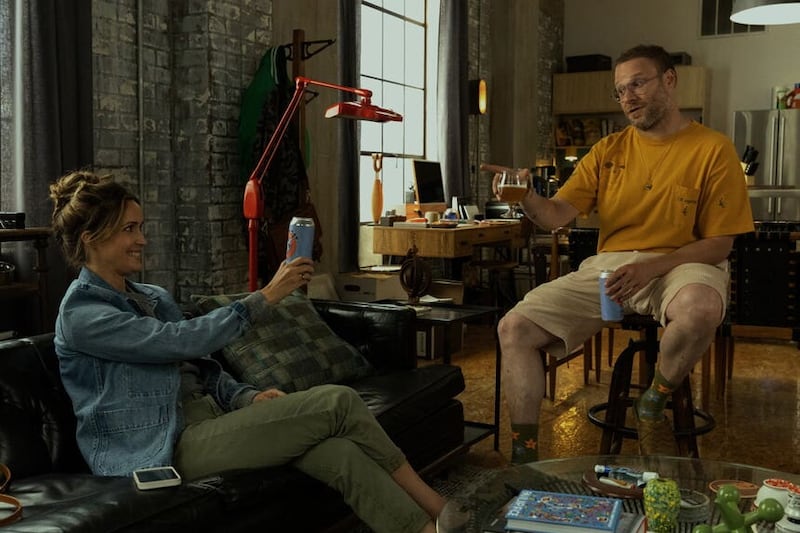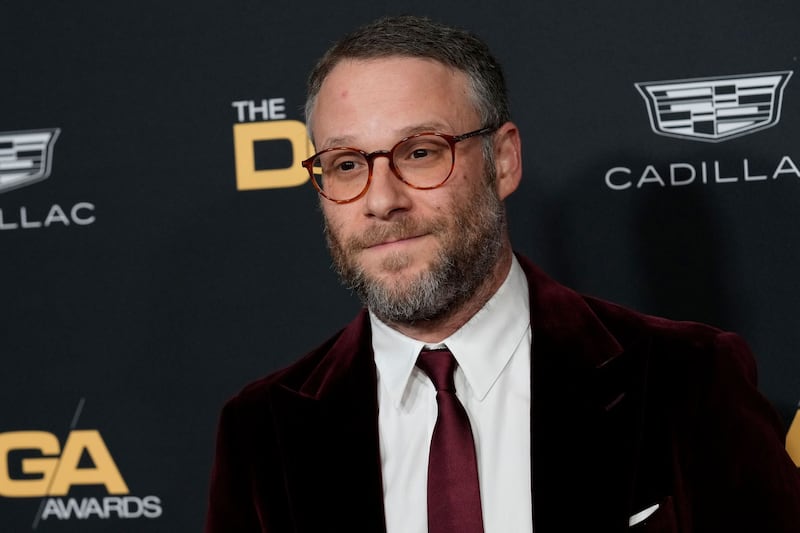SETH Rogen is mulling over how he worked with his co-star in his latest film – himself.
The actor takes on dual roles in the comedy An American Pickle, about a factory worker in 1919 who falls into a vat of pickles and is accidentally brined for 100 years. He is eventually discovered and emerges, perfectly preserved, in present-day Brooklyn to find he hasn’t aged a day and his great-grandson is his only surviving relative.
Rogen plays both Herschel Rosenbaum, who is devastated to learn his wife and child are long dead, and his great-grandson Ben, who cannot relate to his ancestor’s old-fashioned values.
“We shot the movie really weirdly,” the Canadian-born Knocked Up star explains over Zoom from his home in the US. “In that we did all of the Herschel stuff and then I shaved and then we went back and did all of the Ben stuff.
“Herschel is driving a lot of the scenes and I had a guy, Ian, who I was acting with who was my body double but it actually worked really well because Herschel is not that reactionary anyway, he’s kind of ploughing forward like a bull in a china shop.
“So as Herschel I was kind of allowed to drive the scenes and then when I was Ben I could listen to my own performance and react to it.
“It was a weird challenge, especially in the scenes that are very physical. I had these beeps in my ears that would cue me to do things, so I was hearing my own dialogue in an earwig, coupled with several series of beeps, which would signify me to do something. Like beep beep beep, pick up glass.
“Sometimes in one scene there would be four sets of three beeps, each one cuing a different thing.
“I remember the first time I heard the dialogue back, coupled with 12 beeps that signify four different things, I was like, ‘I don’t know if I’m going to be able to do this’.
“But then when I got it I actually took to it pretty well and it became a very fun challenge honestly. I’ve found it was using a lot of tools that I had developed over a few years in a way I’ve never really used them before.”
But for all the acting challenges, Rogen said he deeply responded to the script, based on Simon Rich’s 2013 New Yorker novella Sell Out, about generational differences.
He said: “The story I could not have related to more, honestly. The first conversation me and Simon had about it, one of those things that hooked me was, he said ‘I have this picture of my great-grandfather on my desk when he’s in his mid-20s and I’m in my mid-20s looking at it and I couldn’t help but think that if we were alive and were the same age, he would hate me’, and I couldn’t relate to that more.
“I knew my grandparents my whole life until they passed away; my grandfather was in the navy and he played football, he was a plumber and had no patience for my bulls***.
“And my grandmother’s story actually closely resembles Herschel’s story in the movie. She was born in Poland, fleeing around 1919, and so it really struck me as a combination of both my two grandparents.
“And they were always a huge influence on me, especially comedically, throughout my life. The first joke I ever wrote was about my grandparents. They were both deaf and they would argue with each other and they didn’t know what the other person was arguing about, but they would still argue with each other.”
Rogen, who is now 38, also responded to the disparities over attitudes to religion and faith across generations, and how it mirrored his own journey through Judaism.
“It’s something that was highly relatable and something I pushed hard to weave more and more into the fabric of the movie. And it’s kind of an arc I’ve personally taken,” he says, recalling his own upbringing in Vancouver.
“I went to Hebrew school and I think, like most people, their instinct is to rebel against everything they were taught when they were a child.
“And then I sort of got over it and I’ve really actually found that there is a lot of very useful practical elements to Judaism. Even if from a religious standpoint I don’t necessarily believe in the specifics of it, from an applicable cultural standpoint I see its benefits and around death and grief especially.
“And that is something that is a big theme in the movie, so to me that was a really interesting subject to delve into, how we at times throw the baby out with the bath water as far as our culture and upbringing goes, and how there are essentially useful tools tied into religions, as frustrating as that might be.”
Grief, death and religion might be unexpected topics for a comedy, but Rogen, who is best known for raucous comedies such as Superbad and Pineapple Express, said he is always looking for stories that cut a little deeper.
“We are always trying to do that and to us as film-makers [he has a production company, Point Grey Pictures, with his long-time collaborator Evan Goldberg, named after the Canadian secondary school where they first met] that is always very important.
“As silly as it seems, Sausage Party [an animated film in which he voices a misplaced sausage who embarks on an existential adventure through the aisles of a massive supermarket] is all about religion as well, actually.
“And This Is The End [in which Rogen and his famous friends play themselves at a celebrity party when the apocalypse comes] is weirdly less about religion but is about morality and what it means to be a good person.
“We do try to delve into these themes that for us are personally interesting. At the end of the day, we are just trying to justify to ourselves that we are doing something original and worthwhile.
“Sometimes we convince other people that is the case, sometimes we don’t. But in general, we spend so much time and energy working on these films that if we can’t at least tell ourselves there was something about them that we really personally relate to, and that is additive to the cinematic landscape in some way, then it’s hard to just spend this much time doing something.
“As a film fan there are just not a lot of movies about grief and legacy and how we are raised and what our instincts are and how we reject our past, out of pain sometimes, but we still reject it.
“I couldn’t think of a ton of movies that delve into that, especially movies about a guy who gets pickled.”
:: An American Pickle is out now in UK cinemas.








